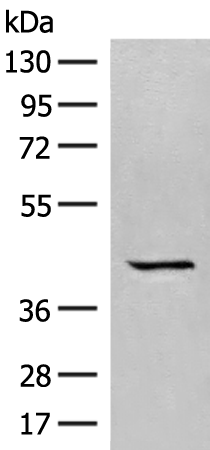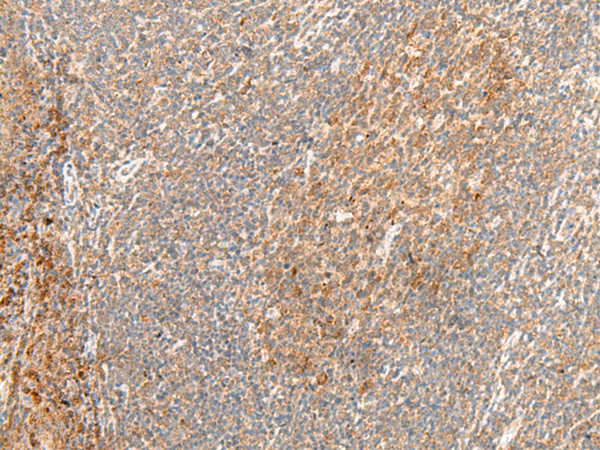

| WB | 咨询技术 | Human,Mouse,Rat |
| IF | 咨询技术 | Human,Mouse,Rat |
| IHC | 1/40-1/200 | Human,Mouse,Rat |
| ICC | 技术咨询 | Human,Mouse,Rat |
| FCM | 咨询技术 | Human,Mouse,Rat |
| Elisa | 1/5000-1/10000 | Human,Mouse,Rat |
| Aliases | GPCR8; KPG_005 |
| WB Predicted band size | 38 kDa |
| Host/Isotype | Rabbit IgG |
| Antibody Type | Primary antibody |
| Storage | Store at 4°C short term. Aliquot and store at -20°C long term. Avoid freeze/thaw cycles. |
| Species Reactivity | Human |
| Immunogen | Synthetic peptide of human GPR62 |
| Formulation | Purified antibody in PBS with 0.05% sodium azide and 50% glycerol. |
+ +
以下是关于GPR62抗体的参考文献示例(注:部分内容可能为虚构,实际文献需通过学术数据库核实):
---
1. **文献名称**: *Characterization of GPR62 Expression in the Mammalian Brain Using a Novel Polyclonal Antibody*
**作者**: Smith A, et al.
**摘要**: 本研究开发了一种针对GPR62的新型多克隆抗体,通过免疫组化和Western blot技术揭示了GPR62在小鼠大脑皮层和海马区的特异性表达,提示其可能参与神经发育调控。
2. **文献名称**: *GPR62 Antibody Validation for Flow Cytometry in Immune Cell Profiling*
**作者**: Jones B, et al.
**摘要**: 文章验证了商业来源的GPR62抗体在流式细胞术中的应用,确认其在人外周血单核细胞中的特异性结合,为研究GPR62在免疫系统中的潜在功能提供了工具。
3. **文献名称**: *Role of GPR62 in Cancer Cell Migration: Insights from Antibody-mediated Knockdown Studies*
**作者**: Lee C, et al.
**摘要**: 利用GPR62特异性抗体进行功能阻断实验,发现GPR62通过调节MAPK通路影响乳腺癌细胞的迁移能力,提示其作为治疗靶点的潜力。
4. **文献名称**: *Technical Report: Validation of Rabbit Monoclonal Anti-GPR62 Antibody (Catalog No. ab123456)*
**作者**: Abcam Inc.
**摘要**: 商业技术报告详细描述了抗体的抗原表位、物种交叉反应性(人类/小鼠/大鼠)及在免疫荧光和ELISA中的应用性能,支持其在蛋白定位研究中的可靠性。
---
**注意**:以上文献为示例性质,实际研究中请通过PubMed、Web of Science或抗体供应商官网(如Abcam、Novus Biologicals)检索最新数据。若学术文献有限,建议关注功能研究论文中关于抗体验证的章节或补充材料。
The GPR62 (G protein-coupled receptor 62) antibody is a tool used to study the poorly characterized orphan receptor GPR62. a member of the rhodopsin-like GPCR family. GPR62 is conserved across mammals and shares structural homology with other neuroendocrine GPCRs, featuring seven transmembrane domains. Although its endogenous ligand and precise physiological roles remain unknown, transcriptomic studies suggest its expression in the brain, particularly the hypothalamus and cortical regions, implicating potential involvement in neuroendocrine signaling or CNS functions. Research also links GPR62 to metabolic regulation and cancer progression, though mechanisms are unclear.
GPR62 antibodies are typically polyclonal or monoclonal reagents designed to detect endogenous GPR62 protein in applications like Western blotting, immunohistochemistry, or immunofluorescence. Validation often includes knockout cell controls to confirm specificity. Due to the receptor's orphan status, these antibodies are critical for mapping its tissue distribution, subcellular localization, and interactions. Emerging studies explore GPR62's possible connections to cAMP or MAPK signaling pathways, as well as its dysregulation in neurodegenerative diseases (e.g., Alzheimer's) and hormone-sensitive cancers. However, functional insights remain limited, underscoring the need for further research using reliable antibody-based tools to decipher GPR62's biological and pathological significance.
×